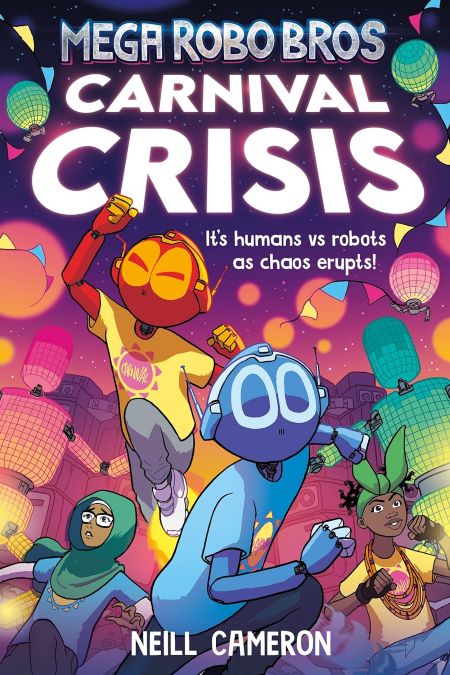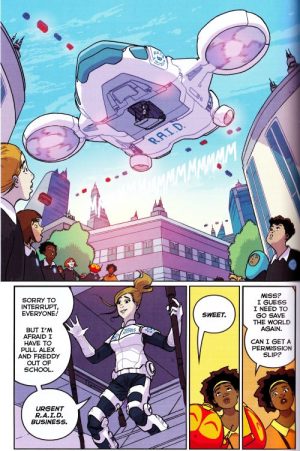Review by Jamie McNeil
It’s carnival time in London, and Alex and Freddy Sharma are looking forward to it. Reports of usually docile utility robots attacking humans, and the growing ire of a faction called Humanity First has not dulled Freddy’s enthusiasm, but he thinks being ordered to hang out with his boring big brother and his mates will cramp his style. Alex isn’t too thrilled about it either but for slightly different reasons. Unlike Freddy who lives in the moment, the older Alex has a growing sense that things are about to change for the brothers. Probably for the worse.
Carnival Crisis is the sixth outing for the eponymous Mega Robo Bros, written and illustrated by creator Neill Cameron, and following the daily life and adventures of two sentient robot brothers. Alex and Freddy Sharma were designed to grow, age, and act like ordinary human children which provides hilarity as humans don’t have their personal inbuilt missile systems and plasma canons. Cameron builds up to the action in layers, and since the stories featured are previously published in the comic weekly The Phoenix, these tales tend to perambulate more than usual through life events as Alex, Freddy, and company experience them on the way to the action.
Compared to previous books Carnival Crisis has a more sedate pace, but is a lynchpin in the series as it sets important plot devices for the next books into play. There’s a deeper sense of foreboding, working off the emotions the cast experience, the older Alex aware of it even if the adults try to tell him it isn’t there. There’s a confrontation on its way but Cameron isn’t rushing towards it, keeping the focus firmly on his young cast. To that extent, it eschews the usual number of big kabooms and offerings of parenting chaos to be more reflective.
Alex is still grappling with the consequences of events way back in Meltdown and is feeling pressurised by his parents to make decisions he isn’t ready for. How Cameron depicts the discussions between Alex and his parents is relatable and sensitively handled. Meanwhile, the younger Freddy is discovering that people can be buttheads, especially to people (and robots) they feel are to blame for their problems. He knows he can do something about it but doesn’t quite understand why he can’t. And while he loves to be the centre of attention, he’s learning it has its disadvantages.
It’s consistently pointed out that Cameron is a great artist who uses his colour palette brilliantly. His futuristic London is always a fun delight and while there’s less action than normal, when it does arrive it is sudden and stupendous. There’s a clever running joke about raising boys in confined spaces that Cameron illustrates magnificently, and while anyone with daughters may not fully appreciate it, anyone with sons will.
Carnival Crisis isn’t quite Cameron’s best, but not because of a dip in artistic quality. It’s more episodic like the weekly publication format with the stories lacking congruence until the second half. Despite that, it’s still enjoyable although more thoughtful as Cameron puts himself in his protagonists’ shoes. There’s a sense that Alex and Freddy are maturing alongside their creator, and it’s a lovely sentiment.
Alex and Freddy head to the seaside for a holiday and face old foes in Nemesis.





